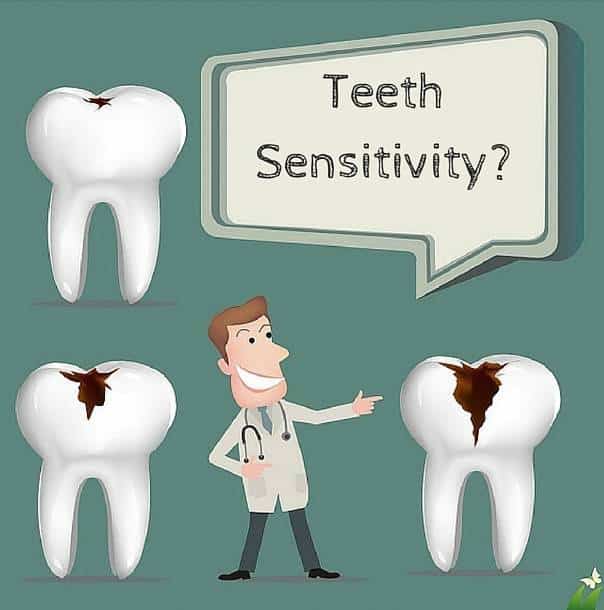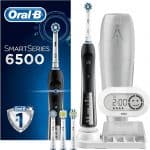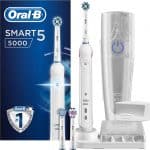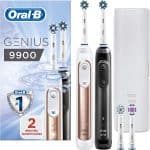Table of Contents
Teeth sensitivity is a common dental problem that affects people of all ages globally, according to the Cleveland Clinic. Essentially, it is a sharp flash of pain and discomfort that occurs in the teeth, usually after getting exposed to certain external stimuli such as extreme temperatures.
Primarily, teeth sensitivity occurs mainly following an exposure of the dentin, the underlying soft tissue that covers the inner layers of the teeth such as the nerves and the pulp cavity.Essentially, the dentin becomes exposed as a result of wear and tear of the external enamel layer of a tooth. Besides, others factors such as gum line recession, Cavities, and cracked teeth may cause the dentin to be exposed, which in turn stimulates the sensory nerve contained in the pulp cavities. Thus, the sensory nerves become sensitive to external stimuli such as temperature, which leads to a sensitive tooth.
Click here to see Best Toothpaste For Sensitive Teeth
Symptoms of teeth sensitivity
Teeth sensitivity has many symptoms..
Primarily, the teeth may become sensitive to extreme temperature changes, especially from a cold or a hot drinks or foods. Such substance may include ice cream, inhaling cold air, or hot coffee. Also, you may experience intense pain and discomfort in the mouth, which occurs when the teeth become exposed to sweet, sour or acidic foods. Additionally, Sensitive tooth may be vulnerable to touch or pressure. Furthermore, one may find it hard and painful to brush or floss their teeth. Notably, sensitive teeth are always accompanied by receding gums.See also: Best Electric Toothbrush For Receding Gums
Causes of teeth sensitivity
- Brushing too hard: Brushing too hard using a hard-bristled toothbrush can make the teeth wear and tear over time. The enamel layer is worn out, thus exposing the dentin, which leads to the sensation.
- Gum Disease: Gum diseases such as gingivitis can cause the teeth to be inflamed, and sore gums pull down the tooth causing infections to the enamel and roots of the teeth.
- Teeth grinding: Sometimes, grinding or clenching your teeth together can cause the enamel to wear down, and therefore expose the dentin, making the teeth sensitive.
- Teeth whitening products: Some toothpaste contains whitening chemicals may be added to help remove the stains; some of these products may significantly reduce the enamel layer contribute to sensitive teeth, which may vary in different individuals.
- Acidic foods: Taking food and drinks containing a high acid content may cause dental erosion; the enamel becomes worn out exposing the dentine layer underneath, which may lead to sensitivity.
- Damage or cracked tooth: A cracked or a broken tooth often causes tooth sensitivity; the crack may be infected with bacteria, which causes inflammation and swellings in the pulp of the tooth. Also, the broken teeth may Extreme temperatures, especially cold, may cause discomfort.
- Plaque build up: A build-up of plaque on the root surface can cause the gum to penetrate down the tooth, which destroys the enamel and cause sensitivity.
- Dental procedure: Dental treatments such as root extraction, crown placement, and tooth restoration procedure takes time to heal the teeth jaws and the gums; at times, this procedure can make teeth sensitive.
Home remedies to help prevent teeth sensitivity
- Regular Brushing: Always make sure to brush your teeth more often; importantly, thoroughly brush all areas of your teeth and mouth and do it gently and carefully especially around the gum area to ensure that gum tissue remain intact.
- Baking Soda: Baking soda can work as a desensitizer. So, using this can help you to get rid of your sensitive teeth.
- Avoid Acidic Foods: Acidic foods such as fruits that has acids in it can make your teeth sensitivity more worse. It’s better to avoid those. Don’t even try to drink fruit juices too.
Dental remedies that can help improve tooth sensitivity
- Use densitizing toothpaste: Desensitizing toothpaste can help you get rid of your sensitive teeth. Luckily, there’s a ton of it. This kind of toothpaste contains supplements that help reduce the nerve sensation in the tooth.We’ve create a list of best toothpastes for sensitive teeth.
- Use fluoride gel and fluoride varnishes: It is an efficient technique that involves applying a fluoride to the sensitive sections of the teeth; essentially, it aims at strengthening the enamel layer, thus preventing the entry of the sensation into the sensitive inner layers of the teeth.
- Use of Dentin sealers, crown or bonding: This dental treatment is applied when the tooth is intensively decayed, thus exposing the root surfaces which causes root sensitivity; it may involve applying a bonding resin, that helps to seal and correct the flaw or decayed teeth. local anesthetic might be needed.
- Use of Surgical gum graft: It involves placing gum tissue on the eroded root surface to help seal the exposed root canal, thus alleviating the sensitivity.
- Use of root canal A root canal can be used as the last- resort treatment when the teeth sensitivity may become more intense and severe even after applying other treatments options. It is an extremely efficient treatment that occurs in the tooth’s soft core tissues at dental pulp and helps to solve the problem completely.
Final Verdict
Now you know the symptoms, causes and remedies of teeth sensitivity. Let your friends know by sharing.













